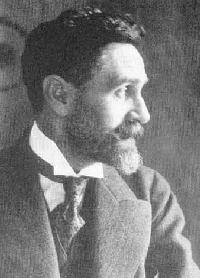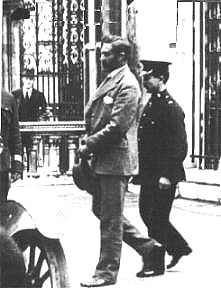Another flawed brave hero

Thursday 3 August was the 90th anniversary of Roger Casement's execution. Profile by Vincent Browne
He was paranoid, solitary, depressive and a hypochondriac. He was probably a paedophile. Although executed in 1916 as an Irish patriot, he worked for many years for the British Foreign Office, he accepted a knighthood, he played no role of consequence in Irish affairs. And yet he was heroic for he was one of the first and most courageous human-rights defenders of the 20th century. His work forced a wicked monarch to divest himself of a vast African colony. He attracted world attention to human-rights abuses in two continents. Although in his personal life he must have caused damage to countless young boys, with whom he had sexual relations for which he paid money, he must also have brought solace to tens and maybe hundreds of thousands of people in what is now the Democratic Republic of Congo and Peru, on whose behalf he spoke out eloquently and fearlessly.
Roger Casement was born in Sandycove, Dublin on 1 September 1864. His parents died before he was 10 and, along with his two brothers and a sister, he went to live with a relative's family in Ulster, where he went to school. Afterwards, he joined a shipping line in Liverpool, went with it to Boma, on the mouth of the Congo river. He later returned as one of the volunteers of William Morgan Stanley, the most celebrated explorer of his day. He worked for a year on the building of a railway line and then got a job to survey conditions in Niger, which brought him to the attention of the British Foreign Office. He was appointed British consul in what is now Mozambique and afterwards in what is now Angola and was asked by the Foreign Office to investigate alleged malpractices in the Congo Free State, then under the personal control of King Leopold II of Belgium.
 His report caused an international sensation, detailing atrocities perpetrated by agents of Leopold, desperate to cash-in on the boom in the rubber trade. Labour gangs were formed under Belgian agents, who met targets for rubber extraction by mutilating natives who failed to cooperate. Mounds of severed hands were testimony to this brutality.
His report caused an international sensation, detailing atrocities perpetrated by agents of Leopold, desperate to cash-in on the boom in the rubber trade. Labour gangs were formed under Belgian agents, who met targets for rubber extraction by mutilating natives who failed to cooperate. Mounds of severed hands were testimony to this brutality.
The report caused Leopold to divest himself of the Congo Free State – it became a Belgian colony, resulting in a modest improvement in conditions.
In 1906 he was sent as British consul to Brazil, which he hated. At the time reports emanated from Putumayo in Peru of a British company engaged in the rubber business, again maltreating the native population, and Casement accompanied a commission of inquiry. He published a separate report and it told of practices similar to the atrocities he had found in Congo.
In 1911, he heard he was to be knighted – he had previously been made commander of the Order of St Michael and St George. In a fawning letter to the foreign secretary, he wrote: "I would beg that my humble duty might be presented to His Majesty, when you may do me the honour to convey to him my deep appreciation of the honour he has been so graciously pleased to confer on me."
On a visit to Washington, dinner was arranged for him with President Taft. On a later visit he met the former president, Theodore Roosevelt. By the summer of 1912, just four years before his execution for treason, he was at the summit of his official career, hailed throughout the UK, Europe and America, a confidant of high officials. But by then his thoughts had turned almost exclusively to Ireland, to the language, the Gaelic League and home rule. He was dismayed by the timidity of Asquith's Home Rule Bill of 1912. The Curragh Mutiny of March 1914, when British army officers declared they would refuse to enforce home rule in Ulster, persuaded him Irish independence could be secured only through force.
He became involved in a recruitment drive for the Irish Volunteers and in an attempt to import arms. It was in that connection that he went to America in July 1914. There he became caught up in the intrigues of Irish republican politics, never understanding what was going on. John Devoy, the central figure in the IRB in America, was at first suspicious of him, then weary of him and was glad to assist him depart for Germany in a foolhardy attempt to recruit German support for an Irish rebellion, after the Great War had commenced some months earlier.
He left the US for Germany in October 1914 with a Norwegian, Alder Christensen, with whom he was having a relationship. On getting to Norway, en route to Germany, Christensen betrayed Casement to the British and thereafter supplied the British with Casement's dealings in Germany. In Berlin he met senior officials in the German Foreign Office and in December met the German chancellor, Bethmann-Hollwegg. He succeeded in getting the Germans to issue a statement saying that if ever German troops reached Ireland it would not be for the purpose of invasion but to promote Irish prosperity and national freedom. He attempted to establish an Irish brigade among Irish prisoners of war in Germany. It was a hopeless failure. He suffered deep depression while there and insisted on returning to Ireland in April 1916 on a U boat carrying a small amount of arms. Hours after his return, he was captured on Banna Strand, near Tralee, on Maundy Thursday, 20 April 1916. He was brought to London and charged with treason.
His defense was compromised by the calibre of his legal representatives. No senior barrister in London would accept the brief and he ended up with an inexperienced junior counsel and a senior (Kings) counsel, Sergeant Sullivan, brought over from Dublin, who, desperate to be called to the inner bar in London, was primarily concerned with impressing the British legal establishment. Sullivan broke down closing the case for the defense.
Casement's speech from the dock was eloquent in parts and, apparently, its delivery was electric. He was sentenced to death. A reprieve campaign was organised and, in response to that, the infamous Black Diaries surfaced.
The diaries, which Casement kept throughout his adulthood, recounted inter alia serial sexual encounters with men and boys in Africa, South America, London and Ireland. It is evident that many of those encounters were with relatively young boys – aged between 12 and 16 – and in most such instances, Casement paid for their services. He was executed on 3 August 1916. To Eilis, the hangman, Casement appeared to be "the bravest man it fell to my unhappy duty to execute". p
